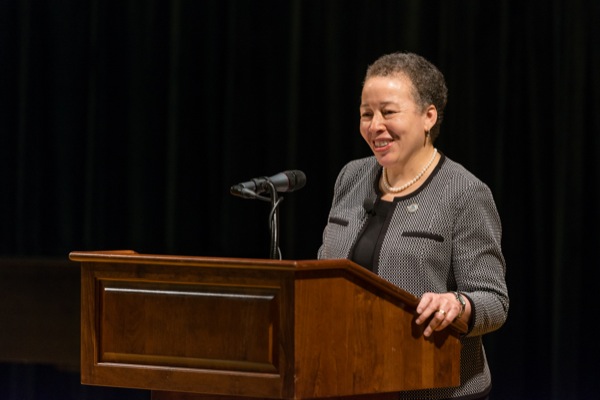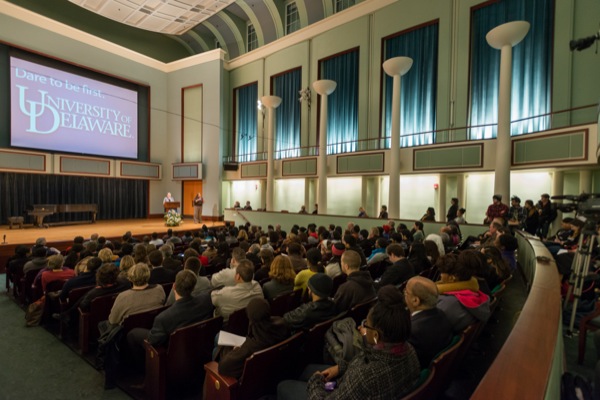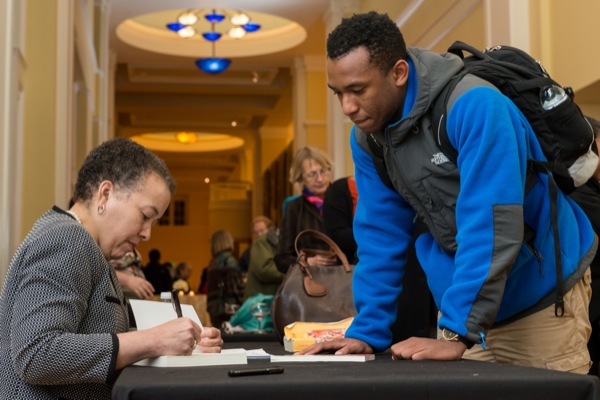


Diversity and democracy
Spelman College president delivers Diversity in Higher Education lecture
4:19 p.m., Nov. 14, 2013--Just as the U.S. population is growing increasingly diverse, the nation’s K-12 schools are becoming more segregated — a situation that poses a threat to the quality of higher education for all groups and to the success of American democracy.
That was the message delivered by Beverly Daniel Tatum, president of Spelman College and a writer and psychologist whose specialty is race relations, to an audience at the University of Delaware on Nov. 12. Her talk, titled “Diversity, Democracy and Leadership: Education for the 21st Century,” was UD’s 2013 Distinguished Lecture on Diversity in Higher Education.
People Stories
'Resilience Engineering'
Reviresco June run
“The decision makers of the future are the college students of today,” Tatum said, calling higher education “a location where crucial connections can be forged” among diverse groups. Research finds that young people who interact with those from different racial, ethnic, religious and socioeconomic groups while in college tend to continue that habit, living in more diverse neighborhoods and having a more diverse group of friends as they get older, she said.
And because this generation will live and work in a highly diverse society, becoming comfortable with people different from oneself is a necessary skill, she said — not just for individual success but also for America’s civic and societal success.
But, Tatum said, school desegregation efforts that became common in the 1980s have more recently been replaced by the concept of neighborhood schools, leading to resegregation in many K-12 classrooms.
“This is a threat to higher education because both white students and students of color will come to college less prepared for higher education,” she said. Students of color will enter college from schools that offered them fewer academic opportunities, and white students will come to campus less socially prepared to interact with a diverse population.
Tatum told the audience that her solution is an ABC approach: Affirming identity, or making sure that all students see themselves reflected in the college community; building community by working to overcome “the persistent social segregation most of us have experienced growing up”; and cultivating leadership by using positions of influence to counteract resegregation trends and to create an atmosphere of inclusion for the younger generation.
“What we say matters, and leadership matters,” she said. “We cannot lock people out and expect success. … We must set the example, and others will follow.”
Tatum became the ninth president of Spelman College in Atlanta in 2002, setting the expectation that the institution would be renowned as a top liberal arts college in the country – “a place where young women of African descent could say, ‘This place was built for me, and it is nothing less than the best.’”
She is the author of such best-selling titles as Can We Talk About Race? And Other Conversations in an Era of School Resegregation and Why Are All the Black Kids Sitting Together in the Cafeteria? And Other Conversations About Race.
She was introduced at the lecture by James Jones, professor of psychology and director of UD’s Center for the Study of Diversity, who noted that he has known Tatum since she was a graduate student, earning her doctorate in clinical psychology from the University of Michigan.
The annual Distinguished Lecture on Diversity in Higher Education is sponsored by the Center for the Study of Diversity, the Office of the President and the President’s Diversity Initiative.
Article by Ann Manser
Photos by Evan Krape










